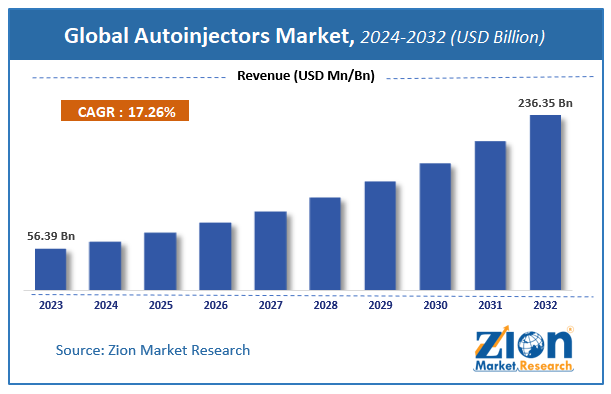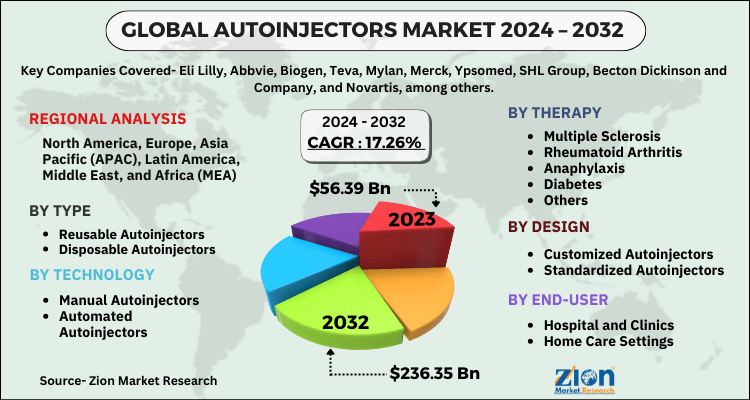Autoinjectors Market Size, Share, Trends, and Forecast 2032

Autoinjectors Market By Type (Reusable Autoinjectors and Disposable Autoinjectors), by Technology (Manual Autoinjectors and Automated Autoinjectors), by Therapy (Multiple Sclerosis, Rheumatoid Arthritis, Anaphylaxis, Diabetes, and Others), by Design (Customized Autoinjectors and Standardized Autoinjectors), and by End-User (Hospital & Clinics and Home Care Settings), and By Region: Global Industry Perspective, Comprehensive Analysis, and Forecast, 2024-2032
| Market Size in 2023 | Market Forecast in 2032 | CAGR (in %) | Base Year |
|---|---|---|---|
| USD 56.39 Billion | USD 236.35 Billion | 17.26% | 2023 |
Autoinjectors Industry Perspective:
The global Autoinjectors market size accrued earnings worth approximately USD 56.39 Billion in 2023 and is predicted to gain revenue of about USD 236.35 Billion by 2032, is set to record a CAGR of nearly 17.26% over the period from 2024 to 2032.
The study includes the drivers and restraints for the autoinjectors market along with the impact they have on the demand over the forecast period. Additionally, the report includes the study of opportunities available in the autoinjectors market on a global and regional level.
Autoinjectors Market: Overview
Autoinjectors are medical devices designed to administer a dose of a specific drug to patients. Autoinjectors are proposed for self-administration of drug dosage by patients. They are easy to use and can be operated by even an untrained person. The autoinjector is designed in such a way that the needle tip remains protected before the drug is injected. These autoinjectors have a passive protection mechanism to stop accidental injection. The syringe needle is inserted by pressing a button for delivering the drug. Autoinjectors comprise glass syringes that make them prone to infection and fragile.
The increasing adoption of targeted therapy, growing anaphylaxis incidences, growing regulatory approvals, simplifying self-administration, increasing biologics use for drug delivery, rising cancer and diabetes cases, advantageous reimbursement scenario, and the availability of generic autoinjectors are likely to be major factors driving the growth of the global autoinjectors market. Patent expiry of current products and technological improvements related to autoinjectors due to an increased focus on research and development is anticipated to further fuel the autoinjectors market globally in the future.
Nonetheless, the growing use of alternative modes of drug delivery, infections and injuries caused due to needle-stick, and multiple regulatory might restrict the growth of the global autoinjectors market in the upcoming years.
In order to give the users of this report a comprehensive view of the autoinjectors market, we have included a competitive landscape and an analysis of Porter’s Five Forces model for the market. The study encompasses a market attractiveness analysis, wherein all the segments are benchmarked based on their market size, growth rate, and general attractiveness.
The report provides company market share analysis to give a broader overview of the key market players. In addition, the report also covers key strategic developments of the market including acquisitions & mergers, new product launch, agreements, partnerships, collaborations & joint ventures, research & development, and regional expansion of major participants involved in the autoinjectors market on a global and regional basis.
Autoinjectors Market: Segmentation
The global autoinjectors market is split based on type, technology, therapy, design, and end-user.
By type, the autoinjectors market is segmented into reusable autoinjectors and disposable autoinjectors. Disposable autoinjectors are likely to grow rapidly over the forecast time period.
The technology segment includes manual autoinjectors and automated autoinjectors.
The therapy segment includes multiple sclerosis, rheumatoid arthritis, anaphylaxis, diabetes, and others.
The design segment includes customized autoinjectors and standardized autoinjectors.
The end-user segment includes hospital and clinics and home care settings. Home care settings are expected to hold the largest share of the global market, owing to the rising use of autoinjectors for self-administration of drugs, technological advancements in the autoinjectors, and increasing prevalence of chronic disorders.
Autoinjectors Market: Report Scope
| Report Attributes | Report Details |
|---|---|
| Report Name | Autoinjectors Market |
| Market Size in 2023 | USD 56.39 Billion |
| Market Forecast in 2032 | USD 236.35 Billion |
| Growth Rate | CAGR of 17.26% |
| Number of Pages | 213 |
| Key Companies Covered | Eli Lilly, Abbvie, Biogen, Teva, Mylan, Merck, Ypsomed, SHL Group, Becton Dickinson and Company, and Novartis, among others |
| Segments Covered | By type, By technology, By therapy, By design, By end-user and By Region |
| Regions Covered | North America, Europe, Asia Pacific (APAC), Latin America, Middle East, and Africa (MEA) |
| Base Year | 2023 |
| Historical Year | 2018 to 2022 |
| Forecast Year | 2024 - 2032 |
| Customization Scope | Avail customized purchase options to meet your exact research needs. Request For Customization |
Autoinjectors Market: Regional Insights
By region, the North American autoinjectors market is likely to lead over the forecast time period. This can be attributed to the growing incidence of anaphylaxis in the U.S., increasing number of FDA approvals, and rising prevalence of chronic and autoimmune disorders, increased biologics use for drug delivery, and growing use of self-administered drugs. Europe is likely to emerge as the second largest market in the future, owing to the growing geriatric population, increasing cancer and diabetes cases, advantageous reimbursement scenario, and growing prescriptions for adrenaline autoinjectors.
The Asia Pacific region is anticipated to propagate at a speedy rate over the forecast time period, due to the increasing cases of chronic disorders, such as diabetes, growing awareness regarding self-administration of drugs, increasing cases of rheumatoid arthritis, and the availability of generic versions of autoinjectors. The Latin American autoinjectors market is projected to develop significantly over the forecast time period. The Middle Eastern and African countries are likely to experience perceptible growth over the estimated timeframe.
Autoinjectors Market: Competitive Space
Some key players of the global autoinjectors market include
- Eli Lilly
- Abbvie
- Biogen
- Teva
- Mylan
- Merck
- Ypsomed
- SHL Group
- Becton Dickinson and Company
- Novartis
This report segments the global autoinjectors market into:
Global Autoinjectors Market: By Type
- Reusable Autoinjectors
- Disposable Autoinjectors
Global Autoinjectors Market: By Technology
- Manual Autoinjectors
- Automated Autoinjectors
Global Autoinjectors Market: By Therapy
- Multiple Sclerosis
- Rheumatoid Arthritis
- Anaphylaxis
- Diabetes
- Others
Global Autoinjectors Market: By Design
- Customized Autoinjectors
- Standardized Autoinjectors
Global Autoinjectors Market: By End-User
- Hospital and Clinics
- Home Care Settings
Global Autoinjectors Market: By Region
- North America
- The U.S.
- Europe
- UK
- France
- Germany
- Asia Pacific
- China
- Japan
- India
- Latin America
- Brazil
- Middle East and Africa
Table Of Content
Methodology
FrequentlyAsked Questions
Autoinjectors are medical devices that are intended to autonomously administer a specific dosage of medication via injection with minimal user effort. These devices are frequently employed for the self-administration of medications, which reduces the necessity for healthcare professional intervention and provides convenience.
Increase in the prevalence of conditions such as diabetes, rheumatoid arthritis, multiple sclerosis, and severe sensitivities that necessitate consistent injection treatments.
The global Autoinjectors market size accrued earnings worth approximately USD 56.39 Billion in 2023 and is predicted to gain revenue of about USD 236.35 Billion by 2032.
The global Autoinjectors market is set to record a CAGR of nearly 17.26% over the period from 2024 to 2032.
By region, the North American autoinjectors market is likely to lead over the forecast time period. This can be attributed to the growing incidence of anaphylaxis in the U.S., increasing number of FDA approvals, and rising prevalence of chronic and autoimmune disorders, increased biologics use for drug delivery, and growing use of self-administered drugs. Europe is likely to emerge as the second largest market in the future, owing to the growing geriatric population, increasing cancer and diabetes cases, advantageous reimbursement scenario, and growing prescriptions for adrenaline autoinjectors.
Some key players of the global autoinjectors market include Eli Lilly, Abbvie, Biogen, Teva, Mylan, Merck, Ypsomed, SHL Group, Becton Dickinson and Company, and Novartis, among others.
RelatedNews
HappyClients
Zion Market Research
Tel: +1 (302) 444-0166
USA/Canada Toll Free No.+1 (855) 465-4651
3rd Floor,
Mrunal Paradise, Opp Maharaja Hotel,
Pimple Gurav, Pune 411061,
Maharashtra, India
Phone No +91 7768 006 007, +91 7768 006 008
US OFFICE NO +1 (302) 444-0166
US/CAN TOLL FREE +1 (855) 465-4651
Email: sales@zionmarketresearch.com
We have secured system to process your transaction.
Our support available to help you 24 hours a day, five days a week.
Monday - Friday: 9AM - 6PM
Saturday - Sunday: Closed






